Daily Eggs (Thailand) has constructed a mega smart layer house 14,000 sq.m holding 405,000 birds under one roof to bolster quality and reduce operating expenses.

Chaiyaporn Seethan, founder and managing director of Porn Pat Sorn Farm, said he visited many advanced layer farms in Asia and Europe before building the mega layers house.
“The cost of our pre-fab housing is highly competitive as it is faster to build. The wall panels and ceiling are well insulated. The automatic ventilation control system keeps the hens comfortable while cutting electricity cost and staff,” he said.
The farm used technology from Italy’s Facco, which is on par with Japan’s most advanced layer farms. Employees at the farm are mostly university graduates who are able to keep up with new technologies and quality control directives.
“We increase machine efficiency, employ capable animal husbandries and the best post laying to achieve the top notch quality egg which is clean, safe and the most appealing,” said Mr Chaiyaporn.
The conveyor system reduces waste resulting from breakage, cracks and dents substantially compared with a conventional operation. So far egg condemnation is below 0.4% which accelerates the project break-even.
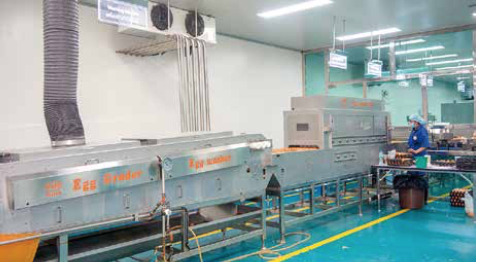
It is smoother and faster than its predecessor. Each day, fresh eggs from the farm are collected, cleaned, graded and delivered to customers within four hours.
Therefore, the birds are not disturbed in the afternoon. They are fed and rest during their egg shell forming cycle.
Equipment
Facco cages and controls have a “black box” that serves as the brain of the entire operation. It regulates air movement, feed and water consumption. It also generates real time reports which enable operators to detect irregularities instantly, for example, declining feed intake, over or under water consumption, unusual mortality, daily and cumulative egg production and more. Data records over the past 90 weeks are retrievable.
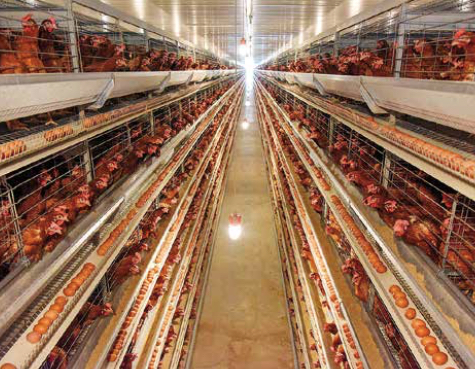
The house is fitted with battery cages in six rows with six tiers and floor space per hen 520 sq cm. Cost per bird housed, excluding land price, is around 620 baht. The distance between rows is 1.6 metres, which is ample for servicing the hens and cage maintenance, he said.
Distance from cooling pads at the front end to the bird is around 58 metres. As a result, air movement in the house is gentle although this is more expensive to construct, said Mr Chaiyaporn.
The housing is designed to live up with Thailand’s high humidity from the beginning, because it can cause discomfort and heat stress which is detrimental to bird health and productivity.
The foundation is prepared to prevent moisture from seeping up into the layer house. The ground is graded, compacted and covered with a layer of stone dust one metre thick and covered with a polyethylene sheet. These protective measures cap maximum relative humidity below 75% even in the rainy season.
Walls are assembled using sandwich panels providing excellent insulation against outside heat. Temperature and humidity in the house is fully controlled. Manure is collected and removed via belts every day.
The birds are fed five times daily. Each feeding event record contains details on the amount of feed consumed and feeding time. The system also tracks water intake. It reports daily egg output and estimates egg collection time.
Feed is provided by three suppliers and quality data is evaluated to prevent bias. Data generated by the black box system shows the manager the profit and loss of the operation every day, he added.
The electric bill for running three conventional houses holding 135,000 birds each is 300,000 baht/month, but the newly installed Facco system slashes that down to 90,000 baht/month for a 70% cost reduction. Only two staff are required to look after the birds.
Of the total of 135,000 birds/house, mortality was around 8 birds/day. However, currently the mortality is under 10 birds day per house of 405,000 birds.
Each compartment has two silos each storing 22 tonnes. Although daily feed consumption is around 15 tonnes, the extra silo is for keeping the birds fed during long holidays.
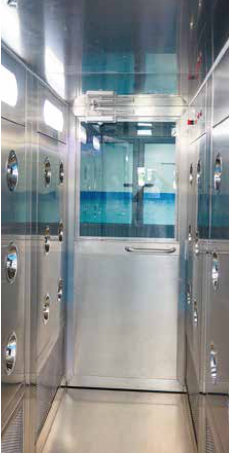
The computerized system automatically regulates wind speed at 600-700 ft/ min. Temperature is maintained between 28-32C. If the temperature exceeds 32C, all 36 fans will start simultaneously.
The breed is Lohmann Brown. At 40 weeks of age, peak percent lay has been sustained above 90% for five months on the row.
“The flock reaches 90% lay per hen housed at 23 weeks of age and we expect the birds will sustain peak performance for 52 weeks or more,” said Mr Chaiyaporn, adding that he expects the flock to deliver around 415-430 eggs/ hen-housed by the time they reach depletion age of 90 weeks.
The mega-house has three sections, each holding 135,000 birds and operated individually. If the third phase is completed, there will be around 405,000 birds under the same roof. The project will reach full capacity in Q1, 2021.
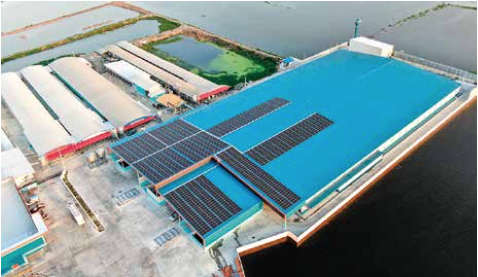
The 79x131x5.5m house worth 250 million baht is built to last. It is designed to withstand gales and the concrete floor is rated to carry a load of 1,000 kg/sq m.
The layer houses are 170 metres away from the grading facility. It takes 25 minutes to deliver the eggs via rod conveyors. Broken, cracked and dented eggs are below 0.01%.
With 135,000 birds per house, it is impossible to obtain such a large batch of single-age pullets to ll it up all at once.
Instead, pullets are sourced in batches with an age difference of up to four weeks.
He said eggs from his operation can stay fresh for 21 days with a reasonable Haugh unit. Retained samples are stored for 21 days for verification to monitor quality and freshness.
With reduced energy costs, improved performance and good egg quality, the investment could break even in just five years, he added.
He has already ordered a bar code system and robots to operate the egg store room on a first-in, first-out basis. The air conditioned room 24x38m is designed to stock 2.5 million eggs. If storing the eggs manually, it could hold up to five million eggs.
Marketing
Operational scale doesn’t matter as long as you can guarantee consistent quality and sell out your eggs every day.
For quality reasons, the eggs under his brand are 100% produced from the company’s farm and guaranteed free of salmonella.
The egg shells are regularly tested for salmonella contamination at the farm. After the eggs are cleaned with warm water, they are tested again to ensure that both unwashed and washed eggs are free from salmonella contamination.
It is a myth that cleaning eggshells with warm water will ruin the eggs, he said. Buyers can replace eggs if they find that our eggs are spoiled, no-questions-asked, he said.
Around 25% of his daily output is distributed via modern trade, while the rest is allocated to around 10 wholesalers within 200 km of Suphanburi province and a wholesaler from Pattani, in the south of Thailand. Around 10% is sold through his own shop in town under the CSF brand.
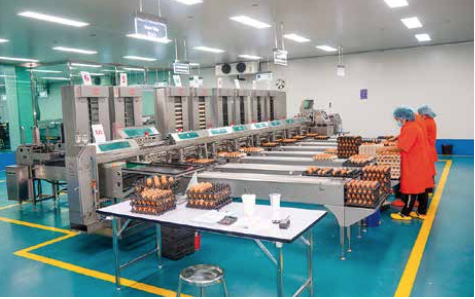
A major retailer has requested that the company supply them with two million eggs/day. But it is too risky to put all one’s eggs in one basket, he said. At the moment, he is revving up output to cater for modern trade clients. At the same time, the company is extending sales and distribution via its distributorships.
Quality assurance certifications are in the works. He has already had GMP, HACCP, Halal, ISO 22000, ISO 8001 and Thailand Trust Mark certified in Q4, 2020.
With the outbreak of coronavirus, no visitors are allowed for farm visits. Meetings can be arranged at the office. However, the visitors will have their temperature checked and must wash their hands before entering the office. This delays the installation and thus entire project will be up and running in Q2, 2021.
It is set to generate electricity from waste and sun light. Meanwhile, installation of biogas reactors 30,000 cubic meters and gen sets are on going. It plans to generate at least 1,600 kw.
Level playing field
He advocates market competition. Producers should be able to create their own markets. If you have more than 500,000 birds, you should neither be a price setter nor be allowed to dominate the market.
He believes that the current breeder importation system that is open to only 16 major producers is unfairly rigging the industry and prevents free market competition.
“If the government grants import rights to 16 key producers, why are these importers exempted from bidding for those import licenses?” he asked, adding that the proceeds of the auction could go to government coffers, similar to telecom industry auctions.
Costwise, large producers who operate parent stock farms and feed mills are more competitive than smaller players, who bear higher costs and are obliged to buy layer chicks or pullets tied in with feed.
The cost of production for small and medium-sized producers is around 2.69 baht/egg, or even higher if their layer housing is underutilized.
Large operators who have parent stock and feed mills enjoy a production cost below 1.9 baht apiece.
“Per capita consumption in Thailand is currently around 250 eggs/year, but that could reach 300 pieces/year if we think laterally about how the eggs can be consumed,” said Mr Chaiyaporn.
“We need to assure consumers about the quality and safety of the eggs and that is achievable by improving egg quality and farming practices,” he added.
